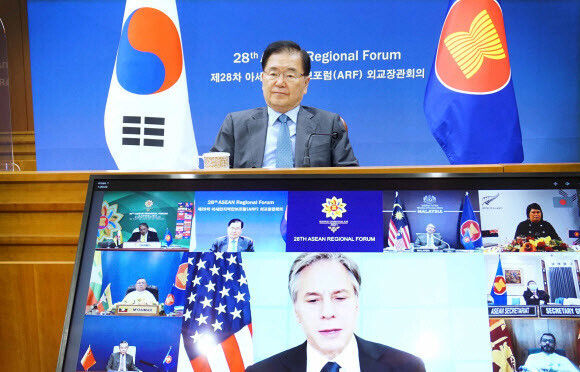hankyoreh
Links to other country sites 다른 나라 사이트 링크
US, N. Korean diplomats have first virtual contact at ARF meeting since Biden took office

Representatives of North Korea and the US sat down together at a meeting for the first time since the administration of US President Joe Biden took office earlier this year at the ASEAN Regional Forum (ARF), which took place via videoconference on Friday.
Due to the constraints of the videoconference format, the two representatives were only able to state their views on the Korean Peninsula situation without engaging in additional discussions, sources reported.
US Secretary of State Antony Blinken was quoted as beginning his remarks during the ARF Foreign Ministers’ Meeting that afternoon by thanking North Korea’s representative, Ambassador to Indonesia An Kwang-il, for the opportunity to “speak directly to North Korea.”
He was also quoted as saying that the “complete denuclearization of the Korean Peninsula is the US government’s goal” and that the US was “prepared to engage with North Korea and looks forward to a positive response from the North Korean representative to our proposal to meet anywhere and at any time.”
Pyongyang has yet to respond to several dialogue proposals from Washington since Biden took office in late January of this year.
Blinken also reportedly said that “the US’ diplomatic efforts toward North Korea were based in the Singapore Joint Statement of 2018 and other agreements,” reiterating Washington’s commitment to honoring that statement as expressed in the joint statement from a South Korea-US summit on May 21.
At the same time, he also reportedly made sure to mention that the North Korean human rights situation was “central to the US’ approach.”
An’s opportunity to speak came sometime later. In his remarks, he was quoted as saying that North Korea “hopes for the peace and stability of the Korean Peninsula” and would “work to ensure self-sufficient national development and security even amid the pressure from hostile forces.”
But he also focused more on talking about North Korea’s COVID-19 control situation than about dialogue with the US, spending around four of his 10 minutes of remarks speaking about pandemic-related issues.
Bringing representatives from North Korea and the US face to face for the first time, the ARF is essentially the only regional security framework in which North Korea regularly participates. In the past, it has been a setting for various forms of diplomatic communication among countries when major difficulties have surfaced surrounding the North Korean nuclear issue.
Pyongyang resolved to work toward improving inter-Korean relations with its decision on July 27 to restore inter-Korean communication hotlines. But it remains firmly committed to its hardline position on dialogue with Washington.
In a statement on June 22, Workers’ Party of Korea Deputy Director Kim Yo-jong commented on remarks made by White House national security advisor Jake Sullivan, who said the US regarded the WPK Central Committee plenary meeting’s position favoring “stable management of the Korean Peninsula situation” as an “interesting signal.”
In an icy response, Kim said, “The expectation, which [the US] chose to harbor the wrong way, would plunge them into a greater disappointment.”
In another statement the following day, North Korean Foreign Minister Ri Son-gwon dismissed speculation from some quarters about possible North Korea-US dialogue.
“We are not considering even the possibility of any contact with the U.S., let alone having it, which would get us nowhere, only taking up precious time,” he said.
By Gil Yun-hyung, staff reporter
Please direct comments or questions to [english@hani.co.kr]

Editorial・opinion
![[Column] Season 2 of special prosecutor probe may be coming to Korea soon [Column] Season 2 of special prosecutor probe may be coming to Korea soon](https://flexible.img.hani.co.kr/flexible/normal/500/300/imgdb/original/2024/0426/3317141030699447.jpg) [Column] Season 2 of special prosecutor probe may be coming to Korea soon
[Column] Season 2 of special prosecutor probe may be coming to Korea soon![[Column] Park Geun-hye déjà vu in Yoon Suk-yeol [Column] Park Geun-hye déjà vu in Yoon Suk-yeol](https://flexible.img.hani.co.kr/flexible/normal/500/300/imgdb/original/2024/0424/651713945113788.jpg) [Column] Park Geun-hye déjà vu in Yoon Suk-yeol
[Column] Park Geun-hye déjà vu in Yoon Suk-yeol- [Editorial] New weight of N. Korea’s nuclear threats makes dialogue all the more urgent
- [Guest essay] The real reason Korea’s new right wants to dub Rhee a founding father
- [Column] ‘Choson’: Is it time we start referring to N. Korea in its own terms?
- [Editorial] Japan’s rewriting of history with Korea has gone too far
- [Column] The president’s questionable capacity for dialogue
- [Column] Are chaebol firms just pizza pies for families to divvy up as they please?
- [Column] Has Korea, too, crossed the Rubicon on China?
- [Correspondent’s column] In Japan’s alliance with US, echoes of its past alliances with UK
Most viewed articles
- 1After election rout, Yoon’s left with 3 choices for dealing with the opposition
- 2AI is catching up with humans at a ‘shocking’ rate
- 3Noting shared ‘values,’ Korea hints at passport-free travel with Japan
- 4Why Kim Jong-un is scrapping the term ‘Day of the Sun’ and toning down fanfare for predecessors
- 5Two factors that’ll decide if Korea’s economy keeps on its upward trend
- 6South Korea officially an aged society just 17 years after becoming aging society
- 7Korea’s 1.3% growth in Q1 signals ‘textbook’ return to growth, says government
- 8Is Japan about to snatch control of Line messenger from Korea’s Naver?
- 91 in 5 unwed Korean women want child-free life, study shows
- 10[Reportage] On US campuses, student risk arrest as they call for divestment from Israel